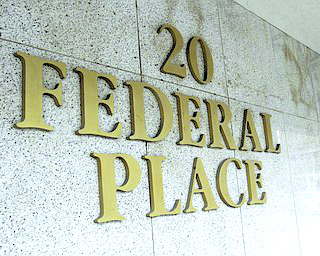Plan for downtown building collapses
City cuts ties to redeveloper, must forfeit $24M in tax credits

YOUNGSTOWN — The redevelopment plan for the city-owned 20 Federal Place downtown building has crumbled.
City officials announced Tuesday it ended its relationship with the potential redeveloper of 20 Federal Place and $24 million in state and federal historic tax credits for the downtown building won’t be used.
The redevelopment of the city-owned building is essentially no further along than it was when the board of control signed a nonbinding memorandum on Dec. 19 with Bluelofts Inc., the Dallas business that proposed a $55 million to $60 million project. But now $10 million in state historic preservation tax credits and $14 million in federal credits, awarded Dec. 21, 2023, are gone.
The city told state officials Tuesday that it would return the historic tax credits, Adam Buente, a deputy law director, said at a city council community planning and economic development committee meeting.
What will happen with the building remains uncertain.
“We have our options on how we’re going to sell real estate,” Buente said. “We can bid it out with the highest bidder getting the property. We can try again (for a third time) with a request for proposal pursuant to the downtown urban redevelopment plan or we can partner with other government authorities.”
He said: “We’re certainly going to try to take the building to the next step soon.”
With Bluelofts teaming with Madrone Community Development Foundation of Berkley, California, which would have owned the building through a nonprofit charitable organization, called a public-private partnership, the tax credits couldn’t be used with that method, Buente and city Finance Director Kyle Miasek said.
When that was determined in late May, Bluelofts shifted its plan from largely affordable / workplace housing to student housing and asked the city to serve as a “backstop” on funding, Miasek said. That meant that the city could be on the hook for up to $4.5 million annually for 30 years if the project’s expenses and debt service weren’t met.
Miasek said: “When we considered all the factors that are in play today with the whole idea of tariffs, deportation of international students, the uncertainty of certain economic activities downtown, we felt that to come to council and ask for that type of commitment was beyond the comfort of the administration.”
The administration decided to “take a step back, reevaluate” because “this is not the path we wanted to go down,” Miasek said. “At the end of the day, we feel that it is not in the city’s best interests financially to enter into a relationship with this type of financial structure.”
A deal to use the tax credits needed to close by Nov. 30, Buente said. The project needed to break ground by the end of the year to be eligible for the credits.
“We did the due diligence on that new (option) for a couple of months and we’ve determined that’s not a route we can go,” Buente said. “It’s not something we can commit to.”
The city was told by state officials that deciding not to use the tax credits wouldn’t impact a future request, Buente said.
The city actually did not request the historic tax credits, as private entities, not governments, are eligible for those credits. The credits were obtained by 20 Federal Place LLC, an organization created by Desmone Architects, the Pittsburgh company that was initially going to do the redevelopment and then later was going to design the project. City officials learned about the tax credits from a reporter from The Vindicator who informed them about the award.
Bluelofts was the only company to submit a redevelopment proposal to the city for 20 Federal Place in September 2024. It was the second time the city sought proposals to redevelop the building at 20 W. Federal St.
BLUELOFTS BACKGROUND
Bluelofts proposed a $57 million project at the building, including 100 apartments to house 180 people in one-to-three-bedroom units with 43 of the apartments being affordable / workforce housing at 80% median income rent as well as 30,000 square feet of commercial space, a small wellness center, and e-commerce and mini-warehouse space on the first two floors for smaller businesses.
Bluelofts’ proposal was to start construction in October and be finished around June 2027.
But that all changed in May when it was discovered that using Madrone would mean the project wasn’t eligible for the historic tax credits. Even the focus on student housing was a failure as it would have been too much of a long-term financial liability for the city.
Buente described the process as trying to put “a square peg in a round hole,” and the city decided to end the relationship.
Bluelofts, founded in 2018, has purchased properties in Cleveland, Dallas, Fort Worth and Atlanta with plans to convert them to residential space.
The only project the company completed is the former Ohio Bell headquarters, now called The Bell, in Cleveland that was redeveloped into 367 market-rate apartments with some retail and commercial space available. That happened with the assistance of another developer after its initial partner, Wolfe RE Management LLC, faced foreclosure on its stake in the 16-story property. Wolfe, a frequent Bluelofts partner, lost two other projects to foreclosure.
The city purchased 20 Federal Place in November 2004 after Phar-Mor, a national retail store company, went out of business. The property was the Phar-Mor Centre, the company’s corporate headquarters. Before that, the 332,000-square-foot building was the flagship location of Strouss’ department store for many decades.
There were 19 tenants, taking up about 20% of the building, before eviction notices were sent in July 2022. Some tenants were given an extension before leaving, but it’s been completely vacant for more than two years.
Because the building was largely empty, it cost the city about $400,000 annually to operate 20 Federal Place when it had tenants, Miasek said. Now, the only costs are electricity and fire suppression.
A city-hired contractor finished a $7.4 million asbestos abatement remediation and partial demolition project 10 months ago — after lengthy delays — at the building. The city received a $6.9 million state grant for the work. The city spent about $1.6 million to make up the difference in the project as well as to hire various contractors and consultants for the building.
“The building is completely clean so we can try to develop it in the future,” Miasek said.
Councilman Mike Ray, D-4th Ward, said: “It’s always disappointing when something doesn’t work out the way we want it to. However, we should keep in mind that economic deals on projects fall apart all the time. The success rate of projects in small business and even large business is pretty cutthroat, and I hope that the folks and the stakeholders and community understand that.”
Ray added: “Sometimes the best thing to do is pull out, reevaluate the situation and look at what’s best for the city. This is just part of the ebbs and flows of business. We didn’t get to make a deal this time. Hopefully we’ll find something else.”


